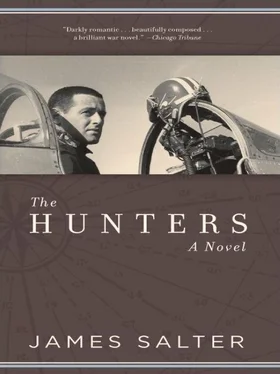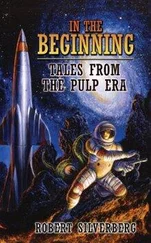The next morning there was rain and a low ceiling. It was the beginning of a spell of bad weather. There were days of no flying whatsoever. Time passed slowly or seemed to have stopped. Through the dismal, dragging afternoons they sat, waiting for the sky to appear once more. In the cell-like rooms they read or talked, the radio playing incessantly. It was like a succession of Sunday mornings in a small town. The hours of idleness were long. In the beginning, Cleve was able to endure them, but inactivity was a relentless grinding stone. A few days of it in a row could bring the calmest man to touchiness and irritability.
There were a few isolated missions, but in marginal weather and through shrouded skies. There were never any sightings. Things seemed dead. It was a time of unreality, and expectations quickly disappeared, like a bet compounded on a dice table and then suddenly lost. It was hard to remember fair days, nor did it seem that they would ever come again.
Once they went in haze that made it like flying through yesterday, until finally, on top, it was as flat as a table at thirty thousand and the horizon was rimmed with a band of green mist. They wandered this plateau in long, straight legs, encountering nothing. Coming back, out over the water, the haze was thinner, and slick patches of it far below looked like gilded mirrors as the sun hit and penetrated them.
There was a mission when they conned across seas of eternity, never catching sight of the ground except at the beginning and end. There was another when, halfway north, near Pyongyang, they heard in their earphones the high whine of what seemed to be gunlaying radar. The radio picked it up by some fluke. There was the thin tone of it, searching back and forth and then suddenly locking on and following them through the intervening clouds until they were out of range. It was a lone message from earth, and the sound of destiny, too, Cleve thought, tracking his path through even the quietest of flights. From all of these they came home at last, low on fuel and unsuccessful.
Billy Lee Hunter was depressed. He sat talking to Cleve one dark afternoon. It was raining outside. The sound of it on the panes of glass was like blowing sand. He didn’t know, Hunter said. Everything was wrong. He supposed he was just not the type.
“Not what type?”
“Oh, you know,” Hunter explained. “The Doctor is the type.”
“Jesus Christ,” Cleve muttered.
“What?”
“Just Jesus Christ. Is that all that’s bothering you?”
“It’s this weather, too.”
“We’ll get good weather. Spring will be here soon.”
“I suppose so. I wonder if it will make any difference, though. Sometimes I think I’ll never see them, no matter what happens.”
“We’ll see plenty of them when the weather breaks.”
“Do you really think so?”
“Sure.”
“It’s all these stories about MIGs being shot down. They read them at home; my dad reads them and wonders why I haven’t done anything here.”
“If your dad thinks it’s so easy to do,” Cleve said, “tell him to come over and try it himself.”
“You don’t understand. He’s always been proud of me.”
“Well, you’ll make him proud. Stop whining about it.” Cleve was sorry the moment he had said it.
“Listen here”—the Texas honor had been impinged upon—“I don’t whine. No, sir.”
“Sorry. I didn’t mean that. I know you’re not whining.”
There was a recuperative silence.
“Just stick with it,” Cleve continued. “Things will work out. For all of us. You don’t think I like it any better than you do?”
“No. I guess not. I just get discouraged.”
“Don’t worry, Billy. You’ll get your chance.”
“I wish I knew that.”
“You will.”
“I’ll probably muff it anyway when it comes.”
“No, you won’t. You’re the least likely to muff it of anybody in the flight.”
Hunter looked at him with surprise.
“I mean it, Billy.”
He was a good man, childish and courageous. He reminded Cleve of prep school, when everything had been in moral primaries, and life had seemed as clear as a biography. Hunter’s world had no vague pastels. It was bounded sturdily by boyhood, grand-fatherhood, the Bible, and the Cotton Bowl game. And yet Cleve could not do anything but admire an honest man, no matter how simple. Hunter was a good pilot, too. He had come along quickly. He would be leading elements before long and flights before he was finished. He was considerably better than Pettibone, who still did not seem able to extend himself beyond merely staying in formation; and he was certainly as good, though not as aggressive, as Pell. Hunter was reliable. That was the quality for a wingman. In the end he would accomplish more than Pell. Cleve would see to that. It was a responsibility almost, and he wanted to fulfill it. He vowed to.
“We’ll each get one before long,” Cleve told him.
“I wish I could count on that. I surely do.”
“You can. We’ll get them.”
Cleve sat thinking about it, smoking a cigarette and watching the smoke fall to the ceiling in a blue, distending spire. He stared outside at the raining sky. It could not last much longer. The weather had been miserable for over a week. It would have to improve soon.
In vain, though, they waited. They watched the sky through dismal days. It was never blue. It was like a layer of grief. Almost unnoticed, because it brought no change, the spring started like this. The weather remained sullen. The rain fell drearily from swollen skies. It seemed as everlasting as surf. It came first hard, then soft, like layers of gravel. The slate roofs gleamed beneath it. Dirty streams of water coursed the roads, and the floors of every building were muddy from clodded shoes. Frogs appeared, legions of them. From the cold exile of winter, they returned with a vengeance. The croaking, especially at night, filled the air. In the evenings the club was loud with insane, continuous partying. It was on such a night that Cleve and DeLeo decided to go to Japan for a few days of leave. The idea was like finding a coin in the mud. Nothing was happening anyway, and the weather showed no sign of breaking. It was a perfect time to get away. Cleve was enthusiastic.
Daughters agreed at first to go along, but then in the morning he changed his mind and decided against it. He was too close to finishing, he said. He had more than eighty missions, and he wanted to stay and fly the rest as quickly as he could, even if he only got in one or two during the time he might have been away. A delirium of home, not so far off now, had seized him. He had written to his wife that he hoped to be back before the summer started. The fever was on him, the unbearable longing for home and love that came when the end was near. It was irresistible. At the last he would be moving toward it, heedless of everything else, like a man making his way to an exit in a fire.
Cleve was elated, however. He felt as if a great holiday were at hand. The night before their departure for Japan, he convinced DeLeo that they ought to drive into Seoul for a steak dinner.
“To condition ourselves,” he explained.
Daughters went with them, and they left just after dark. It was the first time Cleve had traveled the road into Seoul since the day he had arrived. Though rougher and more uneven than he remembered, it gave him a strange sense of freedom to be going back over it, away from duty and its demands. Seoul was shattered. There was no traffic on the damp streets. A few weak yellowed lights shone from windows. It seemed a ghost city, with miles of empty trolley tracks threading the gutted shells of buildings stripped of all glass and wood. The wide avenues were like a sour-smelling trip through antiquity.
Читать дальше












